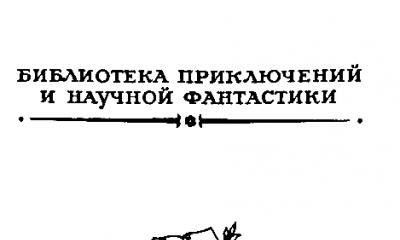In order not to miss new useful materials,
I would name the topic subjunctive mood in English (Subjunctive Mood) one of the most difficult from the “” section for these reasons. Firstly, there are many different forms in this mood, both synthetic (simpler) and analytical (more complex). And in order to know them all, it is necessary to understand how each of them was created. Secondly, the subjunctive mood in English covers both , and , and tenses, and accordingly different forms will be used in different tenses. Thirdly, there are many types of sentences and constructions in which this particular mood is used. And finally, sometimes it is difficult for us to understand and notice the meaning that is implied in each particular case, so sometimes we wonder if it is using the subjunctive mood in English or some other grammatical form.
Be that as it may, if you still learn English grammar and understand the peculiarities of using this mood, then no obstacles to understanding this topic will arise.
What does the subjunctive mood mean: example sentences in Subjunctive Mood
As we know, English has three moods: indicative ( Indicative Mood), and subjunctive. Some grammarians, but not all, also distinguish a fourth - conditional mood ( Conditional Mood). The first indicated mood expresses the reality of action in all three tenses, the second - an incentive to action, a request or an order; but the third (we need) is the possibility, assumption, desire, doubt or unreality of action. Don’t be scared by such vague definitions of moods; examples will make everything clear. The main thing to remember is that in the subjunctive mood in English we can talk about imaginary (desirable, expected) situations that are quite possible under certain efforts or circumstances, or that are never initially feasible.
Had I seen him yesterday, I would have asked him about it. – If I had seen him yesterday, I would have asked him about it.
The subjunctive mood of a verb is most often translated into Russian by combining a verb in the past tense with the particle “would” (and this form applies to any tense). As options: I would like, I could, I would be able to, I would find out, I would wait, etc.
If I were you I should have gone to bed earlier before the exam. – If I were you, I would go to bed early before the exam.
We will talk about two forms of the subjunctive mood of the verb in English - synthetic(Subjunctive I) and analytical (Subjunctive II). Before considering the options for using these two forms, let us dwell on the rules of their formation.
The so-called “old, archaic” or in other words simple (synthetic) forms do not contain any auxiliary verbs. These forms coincide with the forms of the infinitive without a particle to, forms of simple or perfect past tense. If we're talking about Present Subjunctive I, then it should be noted that in this case the form (infinitive without to) remains unchanged, regardless of person and number (that is, no - s at the end in the 3rd person unit. numbers). Verb to be also does not change in persons and numbers in the sentence in the subjunctive mood, it remains so - be.
I suggest that we all go to the concert. – I suggest that we all go to the concert.
It is necessary that all people care of their health. “It is necessary for everyone to take care of their health.
If we're talking about Past Subjunctive I, remember that this form is similar to the form. In this case the verb to be will be in shape were for all persons and numbers. Both the first and second forms find themselves in the expression of actions in three time planes that do not precede the moment of speech.
If only he were free! “If only he were free!”
It’s about time you solved your problems! “It was time to solve our problems.”
And if we're talking about Past Perfect Subjunctive I, then in form it is the same as . In this version, we are dealing with past events that have already happened before the moment of utterance.
I wish I had finished my picture long ago. “It’s a pity that I haven’t finished my painting a long time ago.”
If we had been at the hospital, we should have helped you with your medical insurance. – If we were at the hospital, we would help you with health insurance.
Let's move on to complex (analytical) forms - Subjunctive II. These forms are a combination ( should/would/might/could) and the infinitive of the main verb without a particle to, perfect or non-perfect. Moreover, recently would is practically not used, but for all persons and numbers we take should. Could(past from can) represents the physical possibility of performing an action (could, could), and might(past from may) is responsible for the possibility of performing an action related to the circumstances.
This form of the subjunctive mood in English is Subjunctive II – has two tenses: Present Subjunctive II and Perfect Subjunctive II. In the first case after should we have an infinitive verb without to, but the second is the perfect infinitive of the verb without to. The difference between the present and perfect subjunctive mood of a verb in English is as follows: using the present subjunctive, we talk about a probable, desirable action that may (not) yet take place in the future. If we turn to the perfect subjunctive, we show that the time of the probable action has already passed, but the action itself remains in the plans. Here we can regret, be indignant, wish... but to no avail, since everything has already happened.
Why should I go there? – Why on earth would I go there?
The teacher advised that the girl should be sent to a musical school. – The teacher advised that the girl be sent to a music school.
It’s a pity you should have fallen ill. - It's a pity that you got sick.
If we had had to choose we should have come to another country. – If we had to choose, we would go to another country.
Usually forms Subjunctive I are used in subordinate clauses, and the forms Subjunctive II – in main sentences as part of complex sentences, or in simple sentences. But this is not an axiom; there are exceptions and nuances. About “how” and “where” is used subjunctive mood in English, you can read in the article "". And after that, be sure to take the “” test.
If you find an error, please highlight a piece of text and click Ctrl+Enter.
Agree, it would be great if, in addition to simple constructions, we could compose expressions containing conditions - like in this very sentence. Well, we already have a sufficient grammatical base to be able to figure out how this is done in English, so, as they say, let’s begin with prayer.
9.1 General information
Mood is a grammatical category that reflects the characteristics of the modality of the verb, such as: reality, possibility, probability, ability, desire, order, etc. For example, in Russian there is a distinction between indicative (for example, I say), conditional/subjunctive ( would say) and imperative ( speak) inclinations. In English the situation is much the same, with the difference that the morphological differences between moods are either absent or very slight. In this lesson, we will be interested not so much in the moods themselves, but in the features of their inclusion in conditional constructions, and only then we will dwell in a little more detail on other ways of using them.
9.2 Conditional sentence structure
Conditional sentences in English can take different forms, but the most common conditional grammatical construction corresponds very closely to that in our language:
If Condition, (then) Statement- If Condition, (That) Statement.
Here are some examples:
- If it rains, many people prefer to stay home— If it rains, many people prefer to stay at home.
- If you buy this tablet, I will give you a free case for it— If you buy this tablet, I will give you a free case for it.
- If I had the tools, I could fix the car myself— If I had the right tools, I could fix the car myself.
Over the course of the following paragraphs, we will consider conditional sentences of this very typical structure. But even if we limit ourselves to such a strict framework, we will be faced with a huge number of variations, each of which has its own shades of meaning, peculiarities of use and, of course, its own exceptions - where would we be without them.
9.3 Types of conditional sentences
Due to the rich variety of constructions containing conditions, conditional sentences can be classified in many ways, which is reflected in the variety of classification schemes proposed by linguists. Fortunately, one of them has become quite widespread, and it is this that we will take as a basis, especially since this scheme allows us to draw clear parallels between our two languages, especially in terms of the relationship of grammatical tenses.
So, the proposed model divides conditional sentences into four types, called zero, first, second and third, respectively. The classification does not shine with the expressiveness of its names, but what are they rich in? The model is based on a comparison of the temporal forms of two components: conditions and statements.
9.3.1 Type 0
| Type 0 | ||||
|
Semantic characteristics: General dependencies, cause-and-effect relationships
- If it looks like a duck, walks like a duck and quacks like a duck, it probably is a duck- If something looks like a duck walks like a duck and quacks like a duck, it's most likely There is duck.
- If I stay at work late, my drive home is much shorter- If I Working late then I'm getting there getting home is much faster.
Note: This type is characterized by the possibility of semantic replacement if(if on when(when) and vice versa.
- If you know his email, send him a happy birthday note- If you are You know his email, send Happy birthday to him.
Option: Continuous present tense in condition and/or statement
Option: Present perfect in condition and/or statement
Option: Present tense modals in condition and/or statement
- If you can read this, you are following too closely- If you you can This read, You hold on too close. (inscription on the bumper)
- If you have lost the keys, you should replace your locks as soon as possible- If you lost keys for you should be replaced locks as soon as possible.
- If you are reading this, you must have woken up now- If you are you're reading these lines mean you already there must be, awoke.
9.3.2 First type (Type I)
| Type I | ||||
|
Semantic characteristic: Forecast, promise
- If you sit by the river long enough, you will see the body of your enemy float by- If you will for a long time sit on the river bank then you'll see, as the corpse of your enemy floats by. (Sun Tzu)
- If you bring some ricotta, I will make lasagna for dinner- If grab it ricotta, I I'll do it lasagna for dinner.
Note: When translating sentences of this type into Russian, both the condition and the statement are usually expressed in the future tense.
Never, never say" if you will do something", meaning "if you you will do something"! Just say: " if you do something".
Option: Imperative mood in a statement
- If you find a good deal on travel insurance, let me know - If you'll find good option for travel insurance, give to me know.
Although the formula of this option is the same for conditional sentences of the zero and first types, they should nevertheless be distinguished by their semantic content, since the choice of tense form when translating into Russian depends on this; To do this, you need to pay attention to the meaning of the verb in the condition. So, in the section on the null type, we had this example:
- If you know - If you are You know
We interpreted it this way because the verb to know translated as “to know”, but it does not mean “to find out, find out”. Accordingly, to convey the semantic meaning of “if you find out,” another verb would be used - for example, to find("find, find out"):
- If you find his email, send him a happy birthday note- If you'll find out his email, send him a happy birthday.
9.3.3 Second type (Type II)
| Type II | ||||
|
Semantic characteristic: Hypothetical possibility
- If I studied harder, I would have better marks- If would I was studying harder for me would be higher grades.
- If grandma had balls, she would be grandpa- If would by Grandma were eggs, she would be grandfather.
Note: When translating sentences of this type into Russian, both the condition and the statement are usually expressed in the subjunctive mood.
Note: In sentences of the second type was in the condition is replaced by were:
- If I were younger, I would ask you out- If would I was If I were younger, I would ask you out on a date.
Option: Modal verb Could in condition
- If I could ride a bike, I would join your bike tour- If would I knew how ride a bike, I would join your bike ride.
9.3.4 Third type (Type III)
| Type III | ||||
|
Semantic characteristic: Unrealized opportunity
- If you had listened to me, we would have been home now- If would you me listened, We would now already were Houses.
- If the weather had been better yesterday, I would have gone fishing- If would weather yesterday was better, I I'd go go fishing.
9.4 Castling rule
In most cases, the condition and statement can be freely interchanged. The only rule you need to know is to remove the comma in the inverse scheme:
- If cows could fly, we would need stronger umbrellas“If cows could fly, we would need stronger umbrellas.”
- We would need stronger umbrellas if cows could fly— We would need stronger umbrellas if cows could fly.
9.5 Negation in conditional sentences
Both the condition and the statement can contain a negation, which is formed according to the same general rules that we discussed in the corresponding section.
- If I go fishing tomorrow, I will not be home until late- If I go fishing tomorrow, I will not until the evening.
- If you don't need this player, I will gladly take it- If you not needed this player, I will gladly take it.
9.6 Subjunctive mood
As promised at the beginning of this section, we will now talk a little about the subjunctive mood itself. In a nutshell, it is a verb form expressing a possibility or desire, which is formed according to the formula would + infinitive and is translated into Russian by a combination of the form verb + would.
We have already seen how the subjunctive mood is used in conditional sentences. Another common variant is constructions with specific verbs ( suggest, insist, require, etc.) and adjectives ( important, essential, recommended).
- I suggest that you see the doctor- I I suggest, to You went to the doctor = I suggest you go to the doctor.
- We insist that you leave the premises- We we insist, to You left room.
- Our return policy requires that the merchandise be in its original packaging— Our return policy requires, to product was in original packaging.
Likewise for adjectives.
- It is important that passengers obey the safety rules — Important, to passengers complied with safety regulations.
- We consider it essential that all reports be submitted on time- We guess significant, to all reports served on time.
Please note that the verb in the subjunctive mood in such constructions is used in the form of a “bare” infinitive ( Bare Infinitive).
Conclusion
During today's lesson, we learned that conditional sentences in English are very similar to ours, with the difference that the tense forms used do not always translate one to the other. How exactly they are translated depends on the type of sentence according to the classification we have adopted, which identifies four options for the relationship of tenses in the condition and statement. We looked at all four types and found out what shades of meaning each of them conveys.
We also touched on the subjunctive mood and got an idea of what it means and how it is used outside of conditional structures.
All that remains for us to do is to learn how complex sentences are constructed, and with this the process of laying the grammatical foundation can be considered complete.
Mood in English, as in Russian, helps to understand how the speaker views an action in relation to reality. Mood refers to . There are three inclinations:
- Indicative Mood– the action is considered as real.
- Imperative mood (Imperative Mood)– expresses an incentive to action, an order, a request, advice.
- Subjunctive mood (Subjunctive Mood)– the action is considered not as a real fact, but as an assumption or wish.
As a rule, when studying the topic “Mond in English,” difficulties can arise only with the subjunctive mood. The rest are simple.
Indicative mood in English
In the vast majority of cases, the verb is used in the indicative mood - we are talking about a real action in the present, or. The verb can be in any tense form, active or. In other words, a verb in the indicative mood is “just a verb.”
I don't speak Spanish. - I do not speak Spanish.
Robert lost his wallet. Robert lost his wallet.
Have you seen this man? -Have you seen this man?
Imperative mood in English
The imperative mood expresses the urge to action. One can distinguish an affirmative and a negative form. Affirmative form is formed very simply - you just need to take the verb in its “dictionary” form, that is, without the particle to.
Turn right, then left. - Turn right, then left.
Get in the car. - Get in the car.
Tell me the truth. - Tell me the truth.
If you add a magic word to an imperative sentence please, it can turn from an order into a request, although much still depends on intonation and context.
Pass me those papers. -Give me those documents.
Please, pass me those papers. – Please give me those documents.
To build negative form imperative mood, add don't or don't before the verb.
Don't do that! - Do not do that!
Don't be late, please. - Don't be late, please.
Subjunctive mood in English
The subjunctive mood shows that the action is not considered as real, but as possible, expected or desired. The subjunctive mood is a rather complex topic, but I will try to approach it from a practical perspective, without confusing it with unnecessary (not the most necessary) information.
Forms of the subjunctive mood
It is difficult to say that in the subjunctive mood the verb takes on some special, easily recognizable form. And that's why.
- For all English verbs, except , the subjunctive form does not differ from the indicative form. The only difference is that the subjunctive forms do not have the ending -s in the 3rd person singular.
- Regarding the verb to be, then in the present tense it has the form be in all persons and numbers (in the subjunctive mood). In the past tense - form were in all persons and numbers (in colloquial speech it is often replaced by was).
Another common case is when a desired or intended action is expressed by a combination of verbs , + . It turns out that this combination performs the function of the subjunctive mood.
Cases of using past subjunctive forms
Let me remind you, verb to be in the form of the past subjunctive mood - has the form were in all persons and numbers. In modern English, especially in colloquial speech, it is often replaced by was.
Other verbs in the past subjunctive form look exactly the same as those in the simple past tense (indicative mood).
These forms are used:
1. In the subordinate clause of the second type.
If I were you, I would stay here. - If I were you, I would stay here.
If he were here, he would help us. “If he were here, he would help there.”
If we had more time, we would go on playing. – If we had more time, we would continue to play.
2. In sentences like where wish is used to express regret about something not done.
I wish I were here with you. - It's a pity that I wasn't here with you.
I wish I knew. - It's a pity that I didn't know.
3. In subordinate clauses of the manner of action, joined by the conjunction as if:
He spoke as if he were an expert. “He spoke as if he were an expert.”
He worked as if his life dependent on it. “He worked as if his life depended on it.”
It is these three cases of using the subjunctive mood that are most often found in colloquial speech, films, fiction, and journalism.
It is also worth mentioning when the present subjunctive forms are used - this is unlikely to be very useful to you, but it is advisable to know about it.
Cases of using present subjunctive forms
Verbs in the present subjunctive mood are rarely used, mainly in documents.
1. In sentences with phrases like it is important that, it is necessary that:
It is desirable that the candidate be at the office at 7 o’clock. – It is advisable that the candidate be in the office at 7 o’clock.
Please note that in this example the verb to be is used in the subjunctive form - be.
It was important that they began the operation. “It was important that they started the operation.”
The verb commence is used in the present tense, not the past, since the form of the present tense of the subjunctive mood does not depend on the tense of the verb in the main clause.
2. In subordinate clauses that complement verbs with the meaning of order, proposal, decision, agreement (to command, to order, to propose, to decide, etc.):

Friends! Now I’m not doing tutoring, but if you need a teacher, I recommend this wonderful site - there are native (and non-native) language teachers there👅 for all occasions and for every pocket :) I myself took more than 50 lessons with teachers I found there !
We already know that in the English language there is an Indicative Mood, a Conditional Mood, an Imperative Mood and a Subjunctive Mood. Today I would like to discuss such a grammatical phenomenon as the subjunctive mood in English, its forms, ways of using it in speech, etc. Subjunctive mood in English: forms and examples
Subjunctive mood in English (Subjunctive Mood) are special forms of the verb that are used in certain types of sentences, mainly in dependent (subordinate) clauses. The subjunctive mood in the language we are studying helps to express desire, necessity, goal, assumption and other ideas of this type.
What does it take to form a Subjunctive Mood?
Friends, you need to remember one thing. In English, there are certain constructions and verbs that help form the subjunctive mood. After such constructions, the verb in the subjunctive mood remains, so to speak, in the infinitive, in the initial form. Moreover, in the third person singular there is no ending -s.
Please note the following examples:
- It is important that he be present at the contest. — It is important that he be present at the competition
- The teacher wants we write the dictation. — The teacher wants us to write a dictation.
Since the subjunctive mood expresses in English a goal, desire, necessity, assumption, etc., it is important to pay attention to the syntactic structures that are involved in the formation of Subjunctive Mood:
- It is desirable that - it is desirable that...
- It is essential that - the main thing is that...
- It is important that - it is important that...
- It is necessary that - it is necessary that...
- It is vital that - it is extremely necessary (vitally important) that...
Now look at how these combinations behave in sentences, and what forms the subjunctive mood takes:
- It is desirable that he come to the meeting. — It is advisable that he come to the rally
- It is necessary that we learn Subjunctive forms. — It is necessary that we learn the forms of the subjunctive mood
- It is essential that Tom show us the new forms and methods of teaching. — The main thing is that Tom shows us new forms and methods of teaching.
Also, the subjunctive mood usually involves the following verbs + that:
- Ask - to ask
- Command - to order
- Demand - demand
- Insist - insist
- Recommend - recommend
- Request - demand
- Suggest - suggest
- Want - want
- Desire - to wish
- Wish - to wish
Examples of sentences with these verbs:
- The director insists that every worker know his rights. — The director insists that every employee knows their rights
- Your parents demand that you listen to your teachers. —Your parents demand that you listen to your teachers.
- We want that our children behave well. — We want our children to behave well.
As you can see from these examples, the verb in the subjunctive mood does not change at all; it retains its initial form.  Subjunctive mood and verb tenses
Subjunctive mood and verb tenses
Where should we go?
Friends, everything we have given above is a simplified, colloquial, more Americanized form of Subjunctive Mood. Now let's talk about the British subjunctive mood in English. It is characterized by a design should + infinitive verb. The principle of constructing sentences, syntactic combinations and forms are the same. Note:
- It is important that you should read this book. — It is important that you read this book
- Alex recommends that you should visit a doctor. — Alex recommends that you visit a doctor
- It is necessary that you should persuade him not to do that. “You need to convince him not to do this.”
So, if you use should in sentences with the subjunctive mood, then you will not make a mistake, but on the contrary, you will form a grammatically and linguistically correct sentence.
Other members of Subjunctive Mood
Here it is appropriate to talk about such constructions as a s if + verb, wish + verb, suppose + verb. These grammatical constructions also form the subjunctive forms in English.
It is important to remember that if we use these constructions + verb to be, then this verb takes the form were in any person and number.
Let's start with the form as if + verb. It means “as if, as if.” After it, the verb must be in the Past Simple. For example:
- She looked at me as if I were guilty. — She looked at me as if I was to blame
- Mike behaves himself as if he won the contest. — Mike acts like he won the competition.
If we are talking about design suppose + verb(assume, imagine), then the conditions here are the same: the verb must be in the simple past tense. For example:
- Suppose he were here; what would you do? - Imagine if he were here, what would you do?
- I suppose Alex bought a car as he wanted. — I assume that Alex bought the car as he wanted.
Regarding the form wish + verb(want, desire), then we consider this construction in more detail in a separate article. Here I would like to remind you of a couple of important details. If wish is in the present tense, then the next verb must be in the Past Simple. For example:
- We wish you were at our party
- Alex wishes you organized the ceremony.
If wish in the past tense, that is wished, then the verb must be in the Past Perfect.
- It’s a pity you didn’t pass all the exams; you parents wished you had passed all your exams. — It’s a pity that you didn’t pass all the exams; your parents wanted you to pass all your exams
- Sue wished she had listened to her parents. — Sue would like to obey her parents.
Well, that's it for the subjunctive mood in English. Remember the constructions, build sentences, dialogues and you will succeed!
“If I were a sultan, I would have three wives”, “If only there were mushrooms growing in my mouth” - all these are sentences denoting hypothetical situations that do not occur in life (that is, I am not a sultan, and there are no mushrooms in my mouth) grow).
It is for such things that the subjunctive mood is responsible. The hero of our today's article is subjunctive mood(subjunctive mood) in English.
We will talk about what the mood is in general and the subjunctive mood in particular.
First we will look at this using the Russian language as an example, then we will switch to English. I will explain how it is built and, most importantly, in what cases it may be needed.
So, let's go!
What is "inclination"?

Let's first understand what mood is, using the Russian example.
Mood is what helps us (the speaker) express our attitude to the situation. Blurry definition? Perhaps yes.
But it’s enough for us to remember how the three moods differ in the Russian language:
1. Indicative - manifests itself when we simply want to convey information.
I usually set my alarm for seven in the morning.
In the indicative mood (and only in it!) tenses are distinguished:
Yesterday I set the alarm for seven in the morning.
I'll set the alarm for seven in the morning tomorrow.
2. Imperative - we express a request, order, command - that is, we want someone to do something.
Set your alarm for seven in the morning, please!
3. Subjunctive - expresses an unreal, hypothetical situation that has never taken place in life.
If you set your alarm for seven in the morning, you wouldn't be late!
Note that mood only affects verbs (words that indicate action). They are the ones that change when the inclination changes (compare: posture silt/delivered lju in the indicative; having delivered b in the imperative; having delivered silt would in the subjunctive).
Subjunctive mood in English it has the same meaning as the subjunctive mood in Russian. That is, it is used in relation to a situation that does not occur in reality. And here's what When it is used - that's a separate conversation. We'll look into this later.
For now, let's look at how to put a verb in the subjunctive mood.
Subjunctive mood form
How to put an English verb in the subjunctive mood, that is, in the subjunctive mood?
To do this, you just need to take the usual form of the verb.
For example:
to come (“to come”) - subjunctive form: come
to work (“to work”) - subjunctive form: work
What is the difference from the usual present tense?
It consists in the fact that in the subjunctive mood we never add anything additional! There is no -s after he/she/it:
He usually comes at 10 AM.
He usually comes at 10 am.
I suggest that he come at 10 AM.
I suggest that he come at 10 am.
Also, negation is formed without do, but with the help of not alone:
She picks me up every Tuesday.
She gives me a lift every Tuesday.
I suggest she doesn't pick me up today.
I suggest that she doesn't give me a ride today.
When is subjunctive mood used?
Now that we have found out what a verb looks like in the subjunctive mood, let's look at the cases when this mood is used in English.
1. After certain verbs
There are a number of verbs that require that + actor + subjunctive after them. Basically, these are verbs denoting a wish or advice - that is, a hypothetical situation that we would like to bring to life. Among them:
| Word |
Example sentences | |
| Advise Advise |
[ədˈvaɪz] |
I advise that you check the address you"ve provided. We advise that you do not use this medicine without consulting your doctor. |
| Ask Ask, ask |
[ɑːsk] |
They ask that we provide them with necessary information. She asked that Mr. O"Brian assign her to another department. |
| Demand Demand, demand. |
|
Mr. Johns demanded that the judge listen to him. We demand that our case will be re-opened for investigation. |
| Insist Insist, insist on something. |
[ɪnˈsɪst] |
I insist that she join us. He insisted that we don't call the taxi. |
| Recommend Recommend. |
[ˌrɛkəˈmɛnd] |
I recommend that your brother see his lawyer. He recommended that I don't make a hasty decision. |
| Request Request, request. |
|
We requested that our appointment was moved to 12.00 PM. She requested that her personal information be not disclosed to third parties. |
| Suggest Offer (invite) someone to do something, submit an idea, bring an idea up for discussion. |
|
They suggested that I prepare all the documents in advance. I suggest that we make the final decision as soon as possible. |
2. After if ("if")
There are sentences with “if”, denoting an unreal situation now or in the future (“If I were in your place...”, “If I were a millionaire...”). In them, the word be (“to be”) has its own subjunctive form - were.
This were is used in all cases (I, you, he, she, they) regardless of who we are talking about.
If you were with us now, you would like it in Madrid!
If you were with us now, you would love it in Madrid!
If Bob were on our team, he would come up with a lot of ideas.
If Bob were on our team, he would come up with a ton of ideas.
When we talk about an unreal situation, we mean a conditional sentence of the second type (conditional). Read more about it V this article.
3. After wish (“to want, to desire”)

There is a construction with the word wish, denoting a wish related to the present. Often we are talking about something impossible:
I wish it were summer!
If only it were summer (now)!
Right now Tom wishes he were ready for the exam.
At the moment, Tom dreams of being ready for this exam.
As you can see, after wish there is also were.
Read more about constructions with wish in this article.
4. After some adjectives
Adjectives are words denoting a characteristic (Which? Yellow. Which? Hot. Which? Difficult). There are a number of adjectives that also require the subjunctive mood after them. The design itself looks like this:
It is + adjective + that...
| Word |
Examples | |
| It is best that... It's best to... |
[ɪt ɪz bɛst ðæt ] |
It is best that we leave now. It is best that he bring his passport. |
|
It is essential that... |
[ɪt ɪz ɪˈsɛnʃəl ðæt] |
It is essential that everyone attends the meeting. It is essential that the project be completed in time. |
| It is imperative that... It's imperative that... |
[ɪt ɪz ɪmˈpɛrətɪv ðæt ] |
It is imperative that the prisoner be not left unsupervised. It is imperative that the mission be accomplished. |
| It is important that... It is important that... |
[ɪt ɪz ɪmˈpɔːtənt ðæt ] |
It is important that the client carefully read the contract. It is important that all personnel be instructed. |
| It is recommended that... It is recommended that... |
[ɪt ɪz ˌrɛkəˈmɛndɪd ðæt ] |
It is recommended that these pills be not taken together with other drugs. It is recommended that you mention everything you remember. |
| It is urgent that... There is an urgent need to... |
[ɪt ɪz ˈɜːʤənt ðæt ] |
It is urgent that you reply to this e-mail. It is urgent that we decide the course of action. |
| It is necessary that... Need to... |
[ɪt ɪz ˈnɛsɪsəri ðæt ] |
It is necessary that the client be present during the transaction. It is necessary that all preparations be completed before the experiment. |
There are a few other uses of the subjunctive mood, but these are mostly traditional, established expressions like God save the Queen or Long live the King or so be it. ). We have covered all the main points. I hope the information was interesting and, most importantly, useful!
Reinforcement task
Translate the following sentences into English. Leave your answers in the comments below the article.
1. It is necessary that we be in court at 11 am.
2. I insist that he come.
3. John dreams that his team will be first in the competition.
4. It is important that you do not use these materials without the permission of the owner.
5. If I were a composer, I would write operas.
6. If I were the boss, I would reorganize the entire company.
7. Oh, if only it were Saturday now...
8. The lawyer insisted that I not give unnecessary information to the police.








